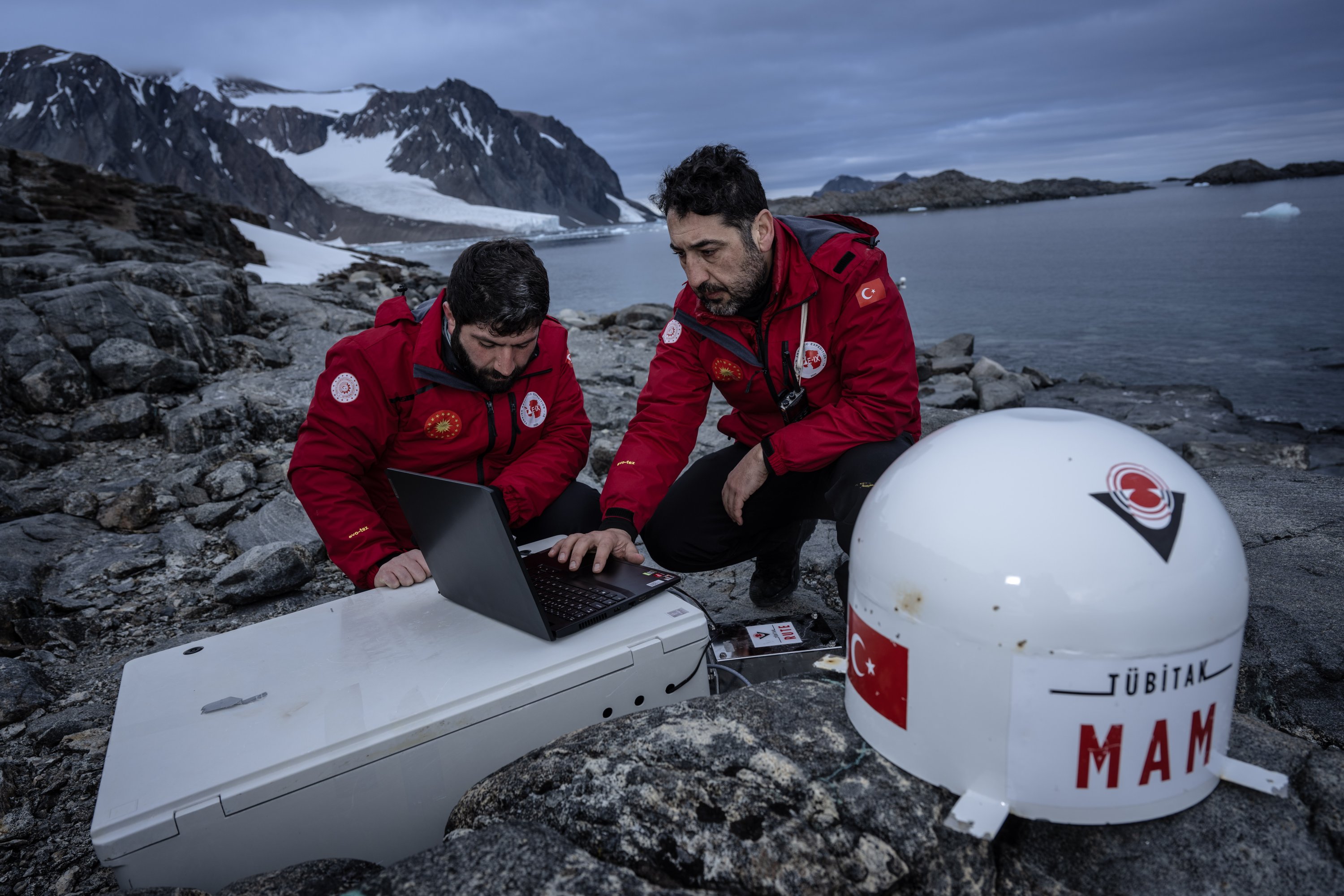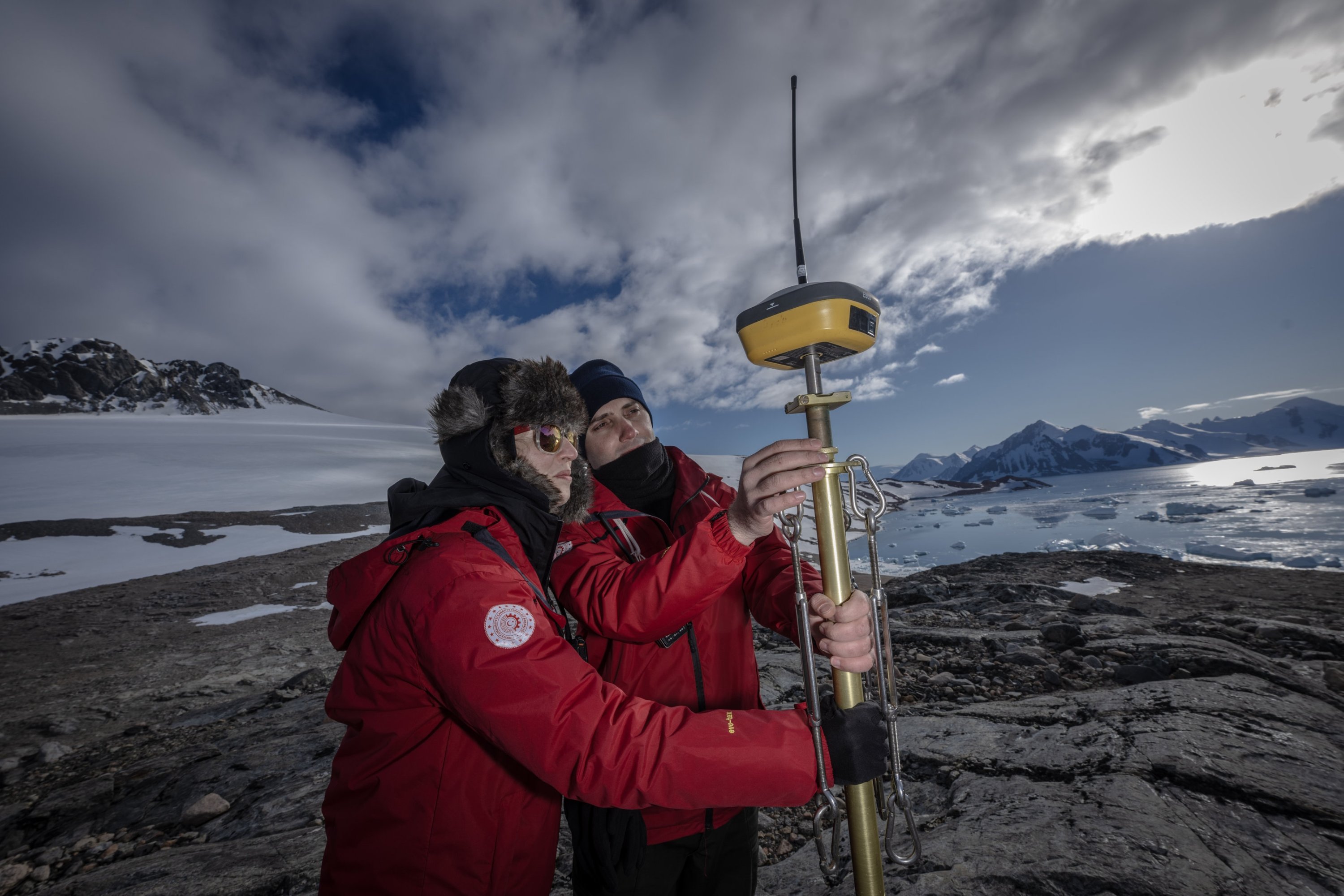© Turkuvaz Haberleşme ve Yayıncılık 2026
When President Recep Tayyip Erdoğan declared Türkiye's ambition to play a role in shaping the future of Antarctica in 2019, the country was only taking its almost first steps on the frozen continent.
Now, just recently on March 7, 2025, by joining the Spitsbergen (Svalbard) Treaty, which defines the status of the Svalbard Archipelago in the Arctic, Türkiye has secured the right for its citizens and companies to participate in maritime and mining activities in the region. Additionally, within its polar objectives, Türkiye has kicked off its 9th National Antarctic Scientific Expedition, aspiring to strengthen Türkiye's scientific presence in the polar regions permanently.
Türkiye's interest stems from a historical legacy dating back to the Ottoman cartographer, navigator and geographer Piri Reis and his 1513 world map, which represented lands near Antarctica.
Following his footsteps, the Turkish team conducted crucial bathymetric studies in Gaul Bay near Horseshoe Island, enhancing maritime navigation. The Turkish Naval Forces' Navigation, Hydrography and Oceanography Department updated bathymetric maps, providing valuable insights into the region's underwater topography. This effort plans to enhance ship navigation, logistics and passenger transfers.
Türkiye also achieved key milestones as part of the expedition, including the first-ever ship passages and hydrographic surveys in the island's northern and northeastern regions.
Another significant effort involved establishing geodynamic stations around the island, including one between Dismal and Horseshoe Island, to study fault lines, volcanic activity and seismic risks. Since 2020, GNSS and GPS measurements have been conducted in Antarctica, and this year, a new geodetic point was added to monitor tectonic movements on Horseshoe Island.
The team continues its scientific exploration while creating a new navigation map for Antarctica and assisting Türkiye's maritime operations and research safety.
While the Turkish Antarctic Research Station strives to build a permanent base on the continent, the nation is just one of the 35 countries that run a national Antarctic program. As this number is expected to rise soon, the key question that comes to mind is why so many nations are investing in activities in such a remote, uninhabited and even hostile part of the world.

Undoubtedly, the Antarctic region is vital for geopolitical, climate and economic reasons. The area boasts a wealth of natural resources, including an abundant supply of edible algae, over 200 fish species and significant iron and copper deposits. Additionally, its strategic geographic position is a key hub for intercontinental air travel via transpolar routes.
The region's geopolitical importance is also visible in its access to space, integration into global maritime communication networks and role in advancing scientific research and environmental sustainability.
Moreover, Antarctica is essential for studying climate change, as its extensive ice sheets and unique weather patterns offer valuable hints about global temperature fluctuations. Regional research allows scientists to monitor rising sea levels and long-term shifts in the Earth's climate system.
Last but not least, the possibility of rich oil, natural gas, freshwater, coal and minerals deposits drives nations to stake claims in the region. In early May 2024, the United Kingdom estimated that the Weddell Sea, part of its claimed Antarctic territory, holds around 511 billion barrels of oil – about 10 times the North Sea's total production over the past 50 years. Hence, unsurprisingly, Antarctica continues to attract interest from many countries due to its potential natural resources.
Initially, sovereignty claims over Antarctica were based on geographical proximity, historical ties, strategic interests, economic prospects and scientific discoveries. Starting from the 1900s, Argentina and Chile saw Antarctica as a natural extension of their territories, while Australia and New Zealand sought to legitimize their affirmations over their proximity. France and Norway, on the other hand, based their claims on historical exploration. Great Britain joined the convoy to expand its influence by claiming certain territories. Nazi Germany, the United States and the Soviet Union (USSR) perceived the continent as military and ideological power for national prestige.
The principle of sovereignty has seemed to face erosion in international relations since the end of the Cold War, particularly in regions like Antarctica, where governance is shaped by international treaties rather than national ownership. However, a different yet related example of polar geopolitics just recently emerged when U.S. President Donald Trump expressed interest in purchasing Greenland. Although Greenland is an autonomous territory under Denmark rather than an internationally governed region like Antarctica, such territorial claims display polar territories' strategic importance in global politics.
If we turn back our scope to Antarctica, many countries have been using scientific exploration and the right of discovery to justify their sovereignty claims. All these developments, along with the growing number of overlapping territorial claims, further increased international tensions.
To end these sovereignty disputes, the 1959 Antarctic Treaty established the continent as a safe zone of scientific cooperation, preventing military and economic exploitation. The treaty halted existing territorial claims and blocked any new sovereignty assertions. While Antarctica remains largely governed under this framework and dedicated to scientific research, its strategic location, natural resources and the impact of climate change could bring aggressive sovereignty claims back into debate in the coming years. Particularly, expanding Chinese and American activities in the region raises concerns about potential tensions in the future.

As this geography stands as one of the focal points of contemporary global power dynamics, Türkiye strategically seeks to have a say on the continent by increasing its presence.
Türkiye's primary strategy in Antarctica is to expand its influence on the international stage through scientific research and to secure a more substantial role in future decision-making processes.
Currently, Türkiye holds a non-consultative member status under the Antarctic Treaty system but aims to be a consultative party. To achieve this, the country must establish a permanent research station on the continent.
Pursuing this goal, under its National Polar Science Program, Türkiye established the Antarctic Science Base on Horseshoe Island in 2019, marking its official presence on the continent. Looking ahead, the nation plans to build a permanent research station and play a more active role in the continent's governance.
Since 2017, Türkiye has been sending scientists to Antarctica each year, conducting research and strengthening its presence on the continent.
To date, Türkiye has carried out a total of 12 National Polar Science Expeditions – eight to Antarctica and four to the Arctic. Nearly 200 Turkish scientists have had the opportunity to conduct over 100 research projects under polar conditions. Thanks to the efforts of Istanbul Technical University’s Polar Research Center (PolReC) and TÜBITAK MAM Polar Research Institute, seismic and meteorological observations have been carried out in Antarctica.
At the same time, Türkiye has engaged in scientific cooperation with more than 20 countries as part of its polar research initiatives. Hosting 22 researchers from 13 different countries on its expeditions, Türkiye has also participated in international missions organized by nine other nations.
Consequently, Türkiye has successfully completed the process for full membership in the European Polar Board, the Scientific Committee on Antarctic Research (SCAR) and the Council of Managers of National Antarctic Programs (COMNAP). This, without a doubt, stands as one of the most striking examples of Türkiye’s effective science diplomacy in recent years.
Rather than pursuing a military or territorial strategy in Antarctica, Türkiye aims to strengthen its presence through scientific diplomacy and international cooperation. However, with growing interest in the continent’s natural resources and intensifying geopolitical competition, Antarctica is set to become an even more contested space in the coming years.
To navigate these shifting dynamics, Türkiye must solidify its scientific presence and secure a more decisive role in international negotiations. In this context, investments in scientific research are not just about academic progress – they represent a strategic move that will shape Türkiye’s standing on the global stage. Ultimately, Türkiye’s presence in Antarctica is no longer a choice but a necessity to stay competitive in the evolving polar dynamics.
